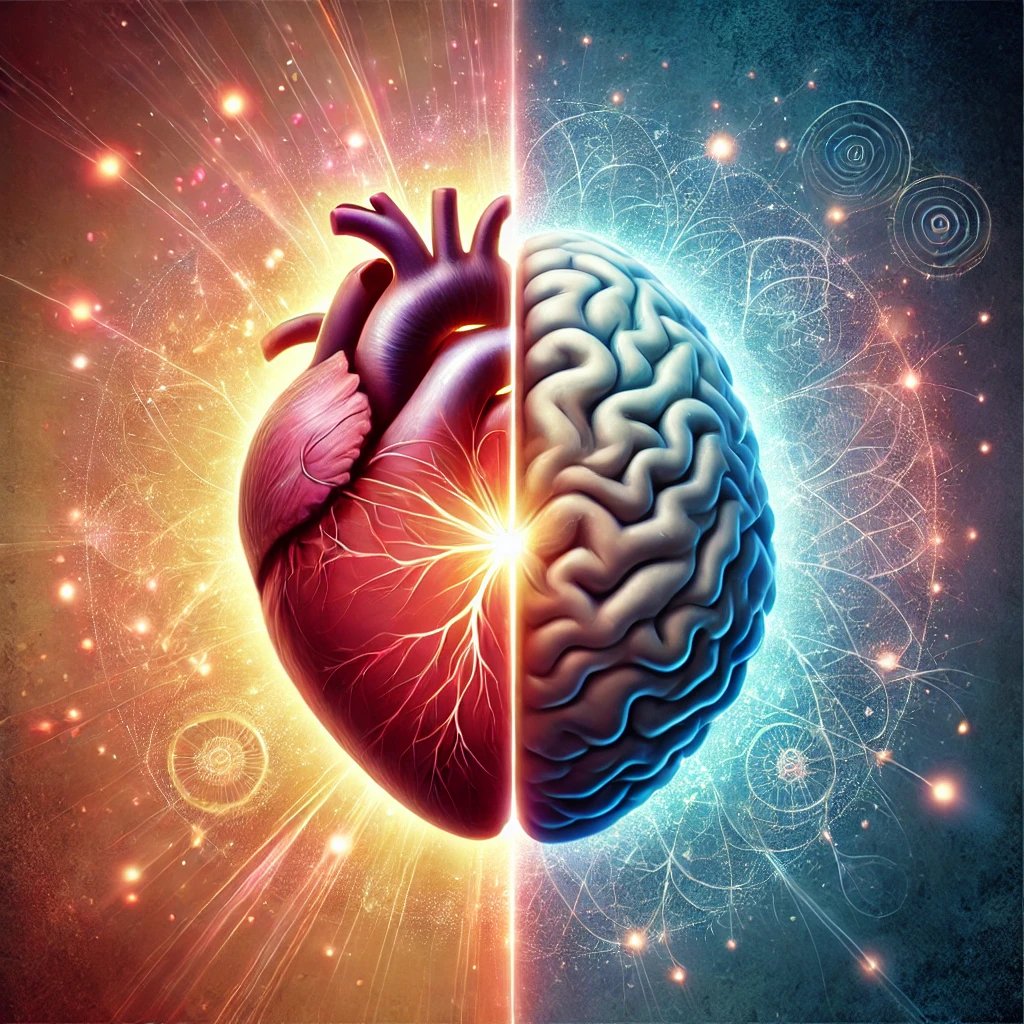The Heart is the Present, and the Brain is the Past
Everything we perceive through our 5 senses and processed by the brain is ever so slightly in the past - even light. The only way to perceive the present is through the heart.
11/28/20243 min read


WE ALL LIVE IN THE PAST. This isn’t some philosophical metaphor or abstract spiritual musing—it’s a fact.
Consider this: every single thing we experience is perceived through our five senses—sight, hearing, smell, taste, and touch. Let’s break that down for a second.
Take hearing, for example. When sound waves hit our eardrums, they set off a chain reaction. The eardrum vibrates in response, transmitting these vibrations to the inner ear, where they pass through a series of tiny bones that amplify the sound. Finally, nerve endings convert these vibrations into electrical signals, sending them to the brain, where we process and identify what we just heard. On average, this process takes about 0.05 seconds. So, by the time we register the sound, we’re technically hearing it slightly after it has occurred.
It’s the same for all our senses. When we smell something, when we taste, even when we touch—it’s all a process of signals being sent to the brain and then processed. It all takes time.
But what about sight? Isn’t light the fastest thing in the universe, as Einstein famously taught us? Isn’t what we see instantaneous? Not quite. Even light, moving at 186,000 miles per second, takes time to reach us. For instance, sunlight takes over eight minutes to travel from the sun to Earth. So when you gaze at the sun, you’re actually looking at it as it was eight minutes ago. The same principle applies to everything else we see.
This means that our experience of reality has a slight "lag." It's like being on a Zoom call where the audio and video are a bit delayed, causing us to talk over each other without realizing the other person has already moved on. We’re always experiencing life just a bit behind the curve, a step behind the actual moment.
So, if everything we experience is delayed, what is the “present moment”? Can we ever actually experience it, or are we destined to forever chase a past that we can never quite catch?
I believe there is a way—and that way is through the heart.
For centuries, humans have intuitively known that the heart is much more than a mechanical pump. It's the symbol of love, intuition, and emotional truth. Look at the wealth of poetry, songs, and stories written about the heart compared to the brain. Yet, modern science has downplayed its significance, relegating it to the role of a glorified blood-pump. But that's starting to change.
There’s a growing body of research that suggests the heart is much more powerful than we’ve ever imagined. I recently came across a documentary from the HeartMath Institute, and it completely shifted my understanding of the heart’s potential. For instance, did you know that the heart has its own neural network, and it actually sends more signals to the brain than the brain sends to the heart? Or that the heart generates an electromagnetic field detectable up to three feet away, far surpassing the brain’s electromagnetic reach?
One experiment, in particular, stuck with me. In this study, participants were shown random images on a screen—some pleasant, some distressing—while researchers monitored their physiological responses. What they discovered was astonishing. The participants' hearts reacted to emotionally charged images before the images even appeared. Their heart rhythms shifted in response to an image moments before it was displayed on the screen. And this response occurred before any measurable change in the brain.
How could this be possible? My theory is that the heart isn't predicting the future—it’s simply attuned to the present moment in a way that the brain is not. While the brain operates within the confines of space and time, the heart seems to be plugged into the “now,” reacting in real-time, unfiltered by the sensory delays that hold our brains back.
So, what does this mean for us?
For me, it means that to truly live in the present, I need to connect with my heart. Our brains, brilliant as they are, will always be slightly behind. But the heart? The heart is in tune with the immediate, with the here and now. That’s why intuition often feels instantaneous—it’s the heart’s language. It’s why we get “gut feelings” about something before our minds can catch up.
To live more in the present, I need to listen more closely to my heart. That means taking a moment to breathe deeply, to feel my heartbeat, and to allow the emotions I’m experiencing to flow through me without trying to intellectualize them. It means trusting my intuition, recognizing that my heart has access to a realm that my brain can’t always comprehend.
In a world where we're constantly encouraged to think our way through life, maybe the real key is to feel our way through it instead. The heart, not the brain, holds the key to living in the moment. And perhaps, the more we tune into our hearts, the more aligned we become with our true selves and that elusive present moment we’ve been searching for.
